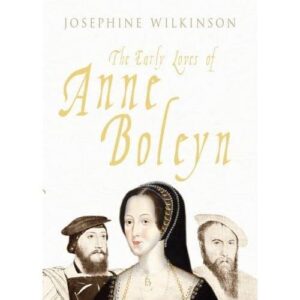
Dr Josephine Wilkinson is an historian and author who has written books on Richard III, Mary Boleyn and Anne Boleyn, and is also one of our guest speakers on The Anne Boleyn Experience 2010 in May.
She has recently used primary sources to research Anne Boleyn, for her book “The Early Loves of Anne Boleyn”, so I thought it would be a good idea to interview Josephine about Anne. Here’s the interview:-
Claire – The blurb on Amazon about your book mentions the Sander story about Anne being banished abroad for becoming entangled with her father’s chaplain and butler, do you think there is any truth in this?
Josephine – I don’t think there was any truth in it; Sander was a recusant Catholic living in exile. Whatever we might think of those who slander people who are in no position to fight back, we have to acknowledge that he had his own reasons for saying the things he did.
C – Alison Weir, in her latest book, talks about how Anne may have been corrupted by her time at the French Court and that Henry was disillusioned when they married and he found out how sexually experienced she was, do you agree with this theory?
J – Life was difficult for a virtuous woman at the French court, as it was in the English court, François was certainly ‘a bit of a lad’, although he was nothing compared to Henry IV of France, whose list of mistresses ran to more than fifty, with at least twice as many children. Anne lived with a woman who was virtually a nun, but that did not mean she didn’t ‘break out’. I think it is dangerous to apply modern standards of virtue to the sixteenth century. Anne might have had a special man in France we know nothing about but, had she been as licentious as some would make out, it would have become known long before she became queen. Also, Henry’s treatment of Anne Boleyn differed markedly from his treatment of Anne of Cleves, whom he thought was not a virgin. He rejected her from the outset, although it is fair to say there were other circumstances to be taken into account in her case.

C – The Tudors series portrays Thomas Boleyn as a manipulator who used his daughters to gain favour and titles yet to Joanna Denny he is some kind of Reformation hero and caring father who strove to protect his daughters, what do you think?
J – Thomas Boleyn is a difficult character. There is much to admire: his diplomatic and political skills, his learning and his great sporting ability. On the other hand, there is much to deplore, not least his strong sense of self-preservation, which prevented him doing anything to help Anne and George following their arrest. The truth probably lies somewhere between Joanna Denny and the Tudors; he was certainly ambitious, and for the king to ‘notice’ your daughters had its advantages. That said, I think Thomas had what it took to rise at court, although Henry’s relationships with Mary and Anne helped him up the ladder a bit. The Seymour family did exactly the same thing as the Boleyns, only with more success. It should, perhaps, be noted, that Sir Thomas’s ability would not have saved him in the event of a fall.
C – You’ve written about Mary Boleyn being ‘Henry VIII’s favourite mistress’ and Henry VIII himself called Jane Seymour his true love, but who do you think was really Henry VIII’s true love?

J – I think, primarily, Henry was in love with love. He was idealistic and put his women on a pedestal; when you raise someone so high, it is difficult for them to live up to the ideal. Mary was his longest-serving mistress, and he kept her even after she had become pregnant, so it is difficult not to conclude that she must have been his favourite.
With Mary, he could be a man, not a king, and she probably made him feel special on that account: she loved him, not his crown. Wives were different; they usually served a political function and were expected to produce heirs. Love seldom came into it, although that did not mean that love could not follow. Henry was one of the few kings ever to have married for love. This was one of the several characteristics that he shared with his grandfather, Edward IV.
To answer your question, I think Henry loved each of his mistresses and his wives, except Anne of Cleves, though perhaps not to the same degree, and each for a different reason. Jane Seymour is the only one to have given him a legitimate son, he included her on a family portrait long after her death, and he chose to be buried with her; this brings a dynastic element to his relationship with Jane that should not be overlooked. Perhaps, on a more cynical note, it might be important that she did not live long enough for him to fall out of love with her. She would always have been safe, but he might have gone on to take mistresses.
C – Your book ‘The Early Loves of Anne Boleyn’ has just been released and you’ve obviously researched Anne’s ‘lovelife’, so who do you think Anne really loved and was she in love with Henry VIII at any point?
J – I think Anne loved Henry Percy, the future Earl of Northumberland, but it was probably little more than an infatuation with an engaging young man; their romance would eventually have run its course and died out. Unless Anne had a mysterious man in France we know nothing about, I think the love of her life was, ironically, King Henry.
C – Alison Weir, in her latest book, talks of how Anne and Henry’s marriage was unhappy from the start, do you agree with this?
J – Anne and Henry certainly married under an unhappy star. Their chances of marital bliss were marred by their difficult circumstances, but I’m not sure they were unhappy right from the beginning. Their relationship has been described as one of ‘sunshine and storms’, meaning that it was far from harmonious. It should be remembered that, even when they were fighting, there was still love – indifference is the opposite of love, and Henry and Anne were never indifferent! Anne was feisty, had a bad temper and was probably hard work at times. She seems to have found it difficult to cross the line from mistress to wife. It does seem, though, that Henry did eventually fall out of love with Anne but that he had to continue with her in order not to lose face. However, I do think that, at some stage, he would have replaced her, by one means or another.
C – There are different opinions about Henry VIII’s involvement in Anne Boleyn’s fall, do you think he was involved in the conspiracy or was he also an innocent victim of Cromwell’s plot?
J – Initially, Henry does not appear to have been involved in the plot against Anne; he might have fallen out of love with her, but she was still his queen and, only days before her arrest, he was still trying to force Charles V to acknowledge her as such. Henry became convinced of Anne’s guilt only when Cromwell had confronted him with the evidence. After that, Henry turned his back on Anne, as he would with Katherine Howard.
C – Which of Anne’s early loves do you think she should have married?
J – Henry Percy showed Anne the innocence of a spring love. He was charming, a pleasant diversion and had a fine future ahead of him as the Earl of Northumberland. However, his betrothal to Mary Talbot, and his financial and personal problems probably would have had an injurious effect on Anne, dampening her spirits, and perhaps driving her to find ‘consolation’ elsewhere. Thomas Wyatt is a most appealing and romantic figure. However, a marriage between Anne and Wyatt would have been impossible due to the fact that he was already married. All he could have offered her was to make her his mistress and she still would have been expected to marry elsewhere, even if she and Wyatt were passionately in love – altogether a most undesirable situation. In all, due to his stability and reliability, his being a man who could look after and support Anne, as well as from a dynastic point of view, James Butler would have made the best husband for Anne.
C – Do you agree with Joanna Denny, who says that Anne was a victim of sexual harassment and that she was ‘stalked’ by Henry? Could she have turned Henry down, or was to keep her virtue and have the relationship on her terms her only course of action?
J – Today we probably would say that Henry stalked Anne and subjected her to sexual harassment. She could have turned him down, though, and she appears to have done so, if we read between the lines of his love letters to her correctly. Henry persevered and won her over with his charm, which was considerable at that point in his life; but he also had an ace up his sleeve – he had started out merely to cultivate Anne as a mistress, but when he decided she could replace Katherine and give him the sons he longed for, he offered to make her queen and Anne, knowing that their relationship would be respectable, accepted.
C – What do you think Jane Seymour was like? Was she an innocent, demure, meek and mild woman or was she scheming and ambitious?
J – I’m not sure I’d say she was scheming because, from her point of view, Anne deserved her fate and it was only right that she should be punished. Jane saw Henry as the innocent victim, whereas we see Anne that way.
Jane must certainly have been an ambitious woman with a strong character, rather than the demure, meek and mild person she is often depicted to be – it would take a very self-assured woman to ally herself to Henry! Also, Chapuys questioned her virtue, suggesting that she was not as pure as she appeared. Jane had the powerful backing of her family, who were every bit as ambitious as the Boleyns were. She tried to involve herself in politics: her attempts to reinstate the Princess Mary, as well as her support for a convent are two examples, but she was wise enough to back down under Henry’s threats. It is also important to bear in mind that, unlike Anne, Jane did not have recusant Catholic exiles spreading depraved stories and gossip about her, so the image of her as the picture of the perfect little wife has come to us relatively untarnished.
Thanks so much to Josephine for answering my questions.
You can click here to read my review of “Mary Boleyn: The True Story of Henry VIII’s Favourite Mistress” by Josephine Wilkinson, and her latest book “The Early Loves of Anne Boleyn” is available to buy now at Amazon UK – click here.
There are now only six rooms left on The Anne Boleyn Experience 2010 Tour which is taking place at Hever Castle next May. Check out the tour website for full details.
New Book Review
I’ve just reviewed David Loades’ book “The Six Wives of Henry VIII” over on our review site – click here to read my thoughts on this recently released book.